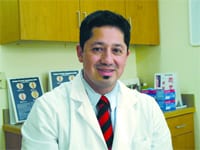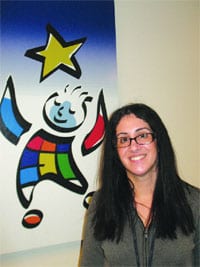Check and Balance Dr. Armando Lopez Has a Chess Master’s Eye and a Musician’s Heart
In this issue, The Healthcare News launches a monthly series profiling doctors who are doing interesting work in the office or hospital — and living intriguing lives outside of it. Our premier profile finds us in the offices of Greenfield Urology, located at Baystate Franklin Hospital in Greenfield, where Dr. Armando Lopez treats a wide range of urological conditions, including prostate cancer, impotence, and incontinence — and still finds time to accompany his kids on the cello at home.
For awhile, Dr. Armando Lopez wanted to get to the heart of the matter. In the end, he followed in his father’s footsteps.
“My father was a urologist in Colombia, so it was kind of an obvious thing for me to do,” he said, “although he tried to convince me to be a cardiac surgeon. For a long time, I was interested in cardiology, and when I was in my first year of medical school, I had an EKG machine and I would take EKGs on my friends.”
But urology wound up being his course of study at the National University of Colombia in Bogota. Following medical school, Lopez worked for a year as a rural physician in El Centro, Santander before moving stateside to the University of Miami for a two-year residency in General Surgery and four-year residency in Urology at Jackson Memorial Medical Center.
He spent the next eight years in practice between Florida and Texas before moving on to a stint in Vermont — and then Massachusetts.
“I think urology is an interesting field,” he said. “It’s not all about cutting and diagnosing and taking care of the illness, although that part is interesting, and has actually been evolving very quickly; I think urology is on the cutting edge, using robotics and a lot of technology.
“But it’s a very happy specialty in many ways; people don’t die on you very often,” Lopez continued. “You can be humane and take time to talk to people, which is one of the most important things for me, as opposed to being very quick and treating people like numbers.”
That can be difficult because of the many pressures on doctors today, he noted — “you’re supposed to see more patients and make more money.” But he makes a point of setting aside time to connect with each patient.
“When I tell someone he has prostate cancer, I take at least an hour to counsel that person,” he said. “Even though the prognosis for that cancer is often good, there are a lot of treatment options, and it can be overwhelming. To even attempt to present these things in a balanced manner to patients can take a long time.”
Lopez said he takes a holistic view of his work, focusing on urological conditions, but in the context of general wellness.
“When I graduated from residency, I used to think surgery was the most fun, but I have actually changed my mind,” he said. “I really enjoy getting to know the patient and taking time to find out what their concerns are. A lot of times, patients become anxious about their condition. I could say, ‘take a dieuretic, see your doctor,’ and I’m done. But I want to spend time with them and relate to them.”
Your Move
Taking time takes patience, of course — and it’s natural for a chess player to have reserves of that.
“Chess was one my father’s other passions,” Lopez said. “He doesn’t play much, but he always thought it was a great game, and he wanted me to learn.”
It was typical of the elder Lopez, who grew up poor and made his way through school with rented books and the rare scholarship. “He wanted to make sure we had everything — so we did fencing classes, piano, tennis, horseback riding.”
Chess was a different animal because very few of Lopez’ peers played the game. But that didn’t stop his father from hiring a teacher and organizing tournaments. “Guess who won?” Lopez said. “Not because I was very smart or anything, but because I was taught.”
The game eventually opened significant cultural doors, however. After winning his first age-15-and-under championship in Columbia, he later was able to travel to tournaments in Paris and Holland, where one of the players was Garry Kasparov. But direct flights were expensive, so he traveled on puddle-jumpers that made several stops over two days.
The passion hasn’t disappeared. Living in Vermont in recent years, Lopez even found himself starting chess clubs. “I figured, with all the time I’ve devoted to it, I might as well pass it on. It’s good for kids — very much like music in the way it helps your memory and your capacity for analysis.”
As for music, he plays cello, piano, and guitar — cello was the most recent he took up, so he could accompany his four children, each of whom play violin or viola along with one or two other instruments. “Of course, now they have to go watch me play in recitals and make a fool of myself, but it has been fun.”
Lopez’s life has, in fact, been a long series of trying new things. He met his wife “over pigs,” he said — specifically, his early experiments with fashioning pig bladders from intestinal tissue, an area of knowledge that today’s doctors have used to build new bladders for people.
Helping people live more fulfilling lives is, after all, the number-one goal.
“It’s so important to take good care of patients,” he said. “Time is short, and you need to make a conscious effort not to let it slip away. This work can be so rewarding.”
More rewarding, in fact, than a hard-won checkmate.



Comments are closed.